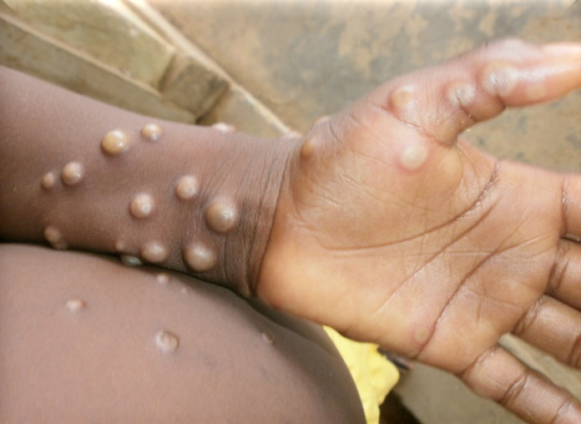One person in the Upper East Region has been confirmed dead after testing positive for monkeypox.
The Upper East Regional Director of Health Services, Dr Emmanuel Kofi Dzotsi confirmed this to JoyNews. According to him, this is the region’s first monkeypox case.
In a press release, he indicated that "the confirmed case was seen on the 22 July 2022 at the Upper East Regional Hospital with history of fever and skin rash."
"Unfortunately, the case died on the 26th of July 2022. Samples were taken on July 22, 2022, for confirmation at the Noguchi Memorial Institute for Medical Research (NMIMR) in Accra. We received feedback on July 28, 2022, indicating the sample tested positive for Monkeypox disease."
Dr Dzotsi added that 13 contacts close to the confirmed case have been identified for contact follow-up and monitoring.
"As of 31st July 2023 no additional cases have been confirmed," he stated.
Meanwhile, the monkeypox outbreak has been declared a global health emergency by the World Health Organization.
The classification is the highest alert that the WHO can issue and follows a worldwide upsurge in cases.
More than 16,000 cases have now been reported from 75 countries, said WHO director-general Dr Tedros Adhanom Ghebreyesus.
There are only two other health emergencies currently – the coronavirus pandemic and the continuing effort to eradicate polio.
About monkeypox
Monkeypox is endemic in countries such as Benin, Cameroon, the Central African Republic, the Democratic Republic of the Congo, Gabon, Ghana, Ivory Coast, Liberia, Nigeria, the Republic of the Congo, Sierra Leone, and South Sudan.
Transmission of virus
Transmission occurs primarily via respiratory droplet particles usually requiring prolonged face-to-face contact, which puts household members of active cases at greater risk of infection.
Transmission can also occur via inoculation or the placenta (congenital monkeypox). There is no evidence, to date, that person-to-person transmission alone can sustain monkeypox infections in the human population.
Secondary, or human-to-human, transmission can result from close contact with infected respiratory tract secretions, skin lesions (open wounds/injuries) of an infected person or objects recently contaminated by patient fluids or lesion materials.
Symptoms
The infection can be divided into two periods:
The invasion period (0-5 days) characterised by fever, intense headache, lymphadenopathy (swelling of the lymph node), back pain, myalgia (muscle ache) and an intense asthenia (lack of energy);
The skin eruption period (within 1-3 days after the appearance of fever) where the various stages of the rash appears, often beginning on the face and then spreading elsewhere on the body.
The face (in 95% of cases), and palms of the hands and soles of the feet (75%) are most affected.
Treatment/Vaccine
There are no specific treatments or vaccines available for monkeypox infection, but outbreaks can be controlled.
Vaccination against smallpox has been proven to be 85% effective in preventing monkeypox in the past but the vaccine is no longer available to the general public after it was discontinued following global smallpox eradication.
Prevention
In the absence of specific treatment or vaccine, the only way to reduce infection in people is by raising awareness of the risk factors and educating people about the measures they can take to reduce exposure to the virus.
Regular hand washing should be carried out after caring for or visiting sick people.
Reducing the risk of animal-to-human transmission. Efforts to prevent transmission in endemic regions should focus on thoroughly cooking all animal products (blood, meat) before eating.
Public health educational messages via the media – broadcast, electronic and social – is highly advised.
Healthcare workers and those treating or exposed to patients with monkeypox or their samples should consider being immunized against smallpox via their national health authorities.
Latest Stories
-
Gwyneth Paltrow eating bread and pasta after ‘hardcore’ food regime
7 minutes -
Strong Institutions, not Strong Men: UPSA forum urges tech-driven reforms to curb tax revenue leakages
14 minutes -
Police fatally shoot man at Toronto’s international airport
18 minutes -
Health of Brazil’s ex-president Bolsonaro has worsened, doctors say
28 minutes -
Ghana is not broke, it is bleeding- UPSA’s Prof. Boadi calls for bold action on tax leakages
28 minutes -
Harry and Meghan call for stronger social media protections for children
39 minutes -
Rotaract District 9104 concludes inspiring District Learning Assembly & Conference 2025 in Takoradi
45 minutes -
New GSS boss Dr Alhassan Iddrisu pledges accurate, timely data for national development
1 hour -
King Mohammed VI launches Kenitra-Marrakech High-Speed Rail Line
1 hour -
Kidney failure survivor sends emotional birthday tribute to Rashida Saani
1 hour -
Police launch investigation into fatal shooting by military personnel at Nyinahin
2 hours -
World Bank to help Ghana provide jobs for over 500,000 youth entering job market each year
2 hours -
2025 Para Athletics: Ghana’s Zinabu Issah wins gold medal in Women’s F57 discuss throw
2 hours -
Banks, SDIs dismissed 155 staff for fraud in 2024 – BoG
2 hours -
Health Ministry launches enhanced mobile app for admission forms, sale rescheduled to May 5
2 hours

